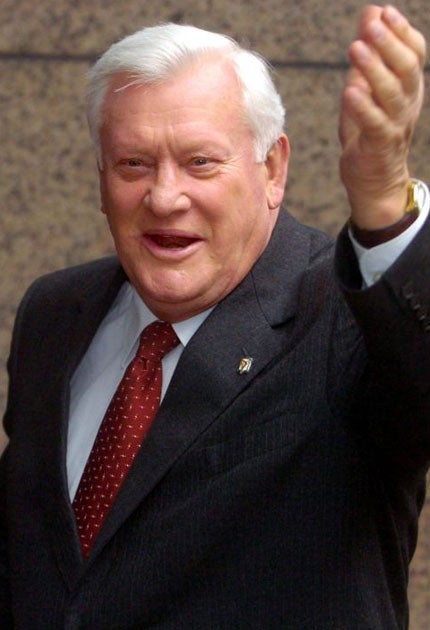Algirdas Brazauskas: Politician who played a crucial role in the break-up of the communist system

Algirdas Brazauskas might not have been the titular leader of Lithuania as it regained its freedom amid the collapse of the Soviet Union. But for two turbulent decades he was his country's most important political figure, who played a crucial part in the dismantling of the communist system – not just in his own small Baltic country, but across the Soviet empire.
He served as Lithuania's first post-Soviet president in the fraught early years of independence during the 1990s, and as prime minister he shepherded Lithuania first into Nato and then into the European Union in 2004, leading the country's return to the West. Nothing, however, eclipsed his role in December 1989, when the Lithuanian Communist party of which Brazauskas was first secretary broke away from the Soviet party in Moscow.
The separation might appear a bureaucratic technicality. In fact, it destroyed the theoretical and organisational foundation on which the Soviet Union was built. It tore away, once and for all, the official fiction that its 15 republics were a happy and seamless constitutional whole. In paving the way for independence, the Lithuanian party set an example that would be followed by other reluctant members of Lenin's supposedly indestructible union.
So alarmed was Mikhail Gorbachev that he paid an emergency visit to Vilnius in January 1990 in a vain attempt to persuade the Lithuanians of the folly of their ways. But Brazauskas stood up to the last Soviet leader, knowing full well that secession was very minimum for the Lithuanian party if it were not to be swept away by the nationalist tide.
In the event it was swept away. In parliamentary elections that February, the nationalist movement Sajudis scored an overwhelming victory – although Brazauskas himself was triumphantly elected, proof of his popularity and of his ability to adjust to the changing times. On 11 March 1990, two months to the day after an angry and uncomprehending Gorbachev returned home, Lithuania became the first Soviet republic to declare its independence. Brazauskas himself was a signatory to the Act.
Faced with a crippling economic blockade imposed by Moscow, the Sajudis government initially agreed to suspend independence pending a negotiated solution. But any prospect of compromise vanished in January 1991 when Soviet troops stormed the television tower in Vilnius, killing at least 13 civilians. A referendum overwhelmingly reinstated independence, and by now the central authority was too weak, divided and distracted to prevent it.
Born into a middle class family in inter-war independent Lithuania, Brazauskas grew up and made his career in a Communist society. An engineer and economist by training, he was a competent administrator and skilled operator who rose quickly through the ranks of both government and party.
Burly and genial, he had a politician's gift of making himself liked, a talent which a fondness for good food and attractive women did nothing to undermine. Like Gorbachev, Brazauskas understood Communism's failings and sought to correct them. Like Gorbachev too, he was by instinct less a revolutionary than a gradualist, who believed the system could be reformed from within.
But by October 1988, when he became Lithuanian party leader – and thus the most powerful man in the country – Gorbachev's policy of perestroika was already unleashing in all three Baltic states demands not just for economic reform but for a restoration of the nationhood stolen by the 1939 Molotov/Ribbentrop pact. As usual, headstrong Lithuania was leading the charge.
In contrast to his hard-line predecessor as first secretary, Brazauskas had already established good relations with the fledgling Sajudis, and delivered a warm address at the movement's inaugural congress that month. He then ordered that the cathedral in Gediminas Square restored to the Catholic Church – a gesture impossible to over-estimate in a country whose Catholicism was an expression of nationalism.
Over the tumultuous three years that followed, Brazauskas was forced to perform an impossible balancing act between satisfying his people's yearning for independence and Moscow's demands for a clampdown. Despite, or perhaps because of that however, he remained at or near the centre of power.
In the first post-independence government he served as deputy prime minister, before becoming the country's first president in 1993. A decade later he was prime minister – at the head of the Lithuanian Social Democratic Party - guiding Lithuania into Nato and the EU.
Domestically his reputation was sullied by corruption scandals and a perception of drift. But Brazauskas the great survivor never lost his countrymen's respect. And in the end even the Kremlin forgave him. A few days before he died, Brazauskas was awarded Russia's Order of Honour, for his work in strengthening ties between two countries that 20 years ago were to all intents and purposes at war.
Algirdas Mykolas Brazauskas, politician: born Rokiskis, Lithuania 22 September 1932; First Secretary, Lithuanian Communist Party 1988-1990; President of Lithuania 1993-1998, Prime Minister 2001-2006; married twice (two daughters); died Vilnius 26 June 2010.
Subscribe to Independent Premium to bookmark this article
Want to bookmark your favourite articles and stories to read or reference later? Start your Independent Premium subscription today.

Join our commenting forum
Join thought-provoking conversations, follow other Independent readers and see their replies